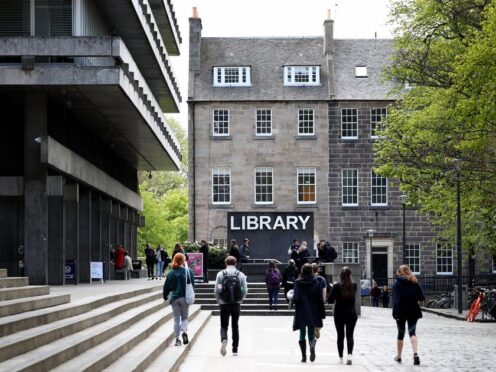
Universities in Scotland should be able to “adapt” to financial pressures, but there will be “implications for the education of Scottish students”, MSPs have been told.
Professor Iain Gillespie, the convener of Universities Scotland – the body which represents the country’s 19 higher education students – issued the warning as he told how funding in the sector was being impacted by a drop in overseas students.
Telling MSPs that some universities had seen their number of international students fall by up to 75%, he explained how income from this group “makes up the gap” for funding for Scottish students.
While universities get cash for Scottish students – who benefit from free tuition when studying north of the border – Prof Gillespie said this did not cover all costs, and that “Scottish students cost money”.
He went on to tell MSPs on Holyrood’s Education Committee that as a result, institutions “need to subsidise Scottish students” with the money they raise from fees charged on international students.
However, he said that the international student market “has declined very significantly indeed”.
Prof Gillespie, the principal and vice-chancellor of the University of Dundee, said the average decline was about “20 something percent” but said that “for some institutions the decline is as much as 75%”.
That comes as he said universities were facing a “real-terms decline in funding for student education”, with cash for research at Scottish institutions also now “falling behind quite significantly our English neighbours”.

Without any change, he said, universities could “really struggle to deal with the financial challenges” they are facing in the next few years.
Prof Gillespie said at the moment institutions could “take mitigating measures that will adapt to the current financial situation”.
But he said: “If the situation we are in continues for another year or two, then we will see real problems in the sector.”
His comments came in the wake of a call from Sir Paul Grice, the vice-chancellor at Queen Margaret University, for a review of Scotland’s flagship free tuition policy to find a “compromise” model that secures the future of the nation’s esteemed higher education institutions.
He said: “In 10 years’ time we must have found a more sustainable, politically acceptable way to fund our universities.”
This morning we're continuing to look at pre-budget scrutiny of the university and colleges sector for the 2025 -2026 budget.
We'll hear from @CollegesScot, the Commissioner for Fair Access, @ProsperScot, @univ_scot and @ScotFundCouncil.
Watch live: https://t.co/xRVSaw5bV4 pic.twitter.com/4KkJ4OKknV
— Education, Children and Young People Committee (@SP_ECYP) June 12, 2024
Meanwhile, Prof Gillespie warned that if universities continue to see international student numbers fall, with no change in the funding model, then in the “next two or three years I think risks will increase”.
He went on to warn MSPs if that happens “then we are likely to see universities really struggle to deal with the financial challenges”.
However, Prof Gillespie also made clear that even with universities adapting to their current financial circumstances, there could be an impact on both jobs and students.
He told the committee: “My opinion is that institutions will adapt, will take mitigating measures that will adapt to the current financial situation.”
But he insisted: “That will not be cost free, that will have impacts on the provision of education to Scottish and non Scottish-domiciled students.
“It will have impact on the scope of our provision, it will have impact on jobs, it will have impact on the ability of universities to continue to drive the economies they sit in the core of.
“My expectation is universities will find ways one way or another of adapting to the headwinds. But there will be a cost.”
He added: “It is my opinion that Scottish universities are in a situation where they are able to adapt, but I want to emphasise it will not be without implications for the education of Scottish students.”
Karen Watt, the chief executive of the Scottish Funding Council (SFC) said that Scottish universities “rely very heavily on international income undoubtedly” adding that cash from this was used to “cross-subsidise teaching and research activity”.
But she told the committee such a funding model was “hugely common” across the world, adding that Scotland will still be a hugely attractive destination” for international students, because of the “high quality education” they receive.
However, she said that the SFC’s mid-year review estimates, the most up to date information available, showed a reduction of “about £40 million from last year in terms of international student income”.
Ms Watt said: “I think from a funder’s perspective we are seeing a big downturn in international income and that is clearly a risk.”

Enjoy the convenience of having The Sunday Post delivered as a digital ePaper straight to your smartphone, tablet or computer.
Subscribe for only £5.49 a month and enjoy all the benefits of the printed paper as a digital replica.
Subscribe